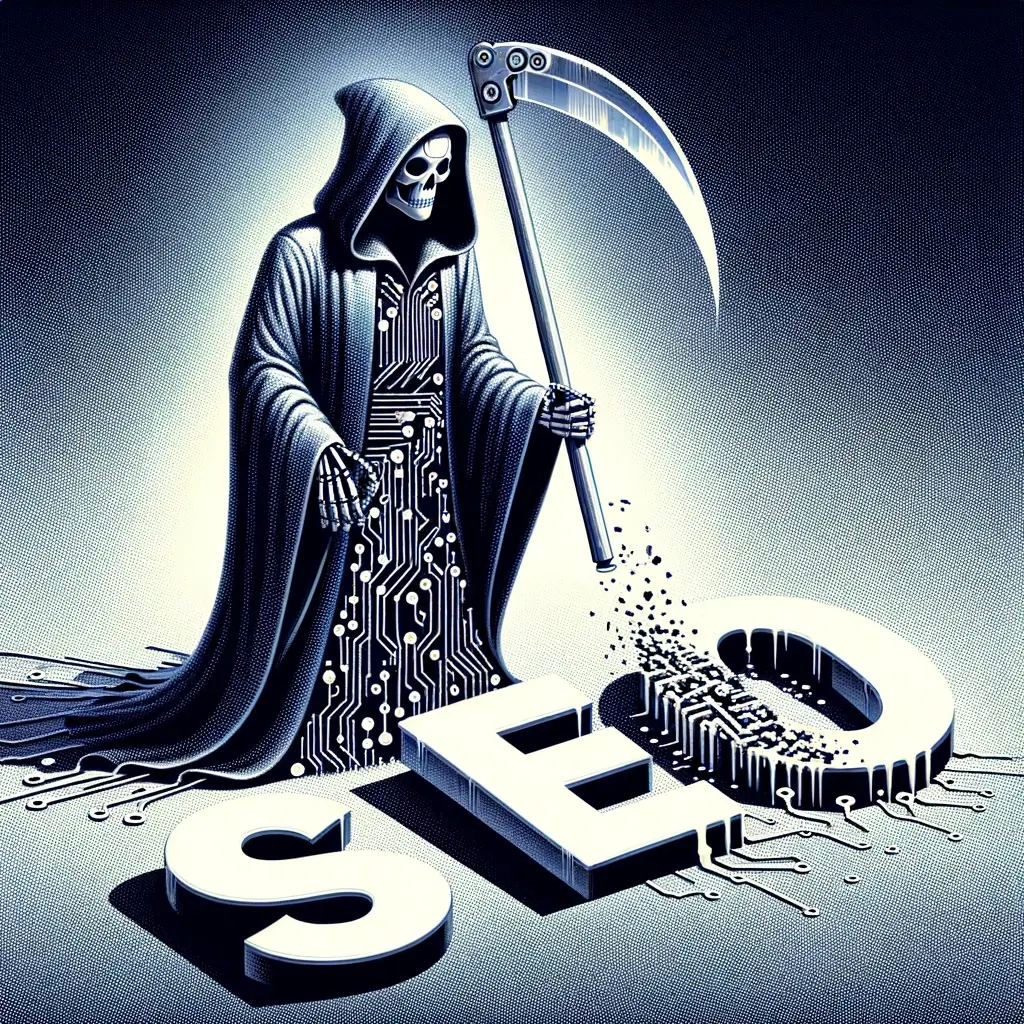Click to Read Sections:
Is SEO and Google Organic Traffic Dead?

A recent prediction from Gartner Group states, “By 2028, brands’ organic search traffic will decrease by 50% or more as consumers embrace generative AI-powered search.” However, Gartner has a history of overestimating the growth and impact of new technologies and software solutions, like SaaS applications, ERP systems, and various SAP products. Gartner, like many analyst firms, tends to have a bias toward larger software firms and new technology, which can influence their predictions.
Plus, a statistic like “By 2028, X% of Y will be using Z” looks good on a PowerPoint presentation at a tech conference. Let’s face it, most of the time predictions like this are just plain wrong. Here’s a list of notable incorrect predictions about technology by the year 2020:

Off-the-Mark Predictions for “By the Year 2020…”
- Self-Driving Cars Will Dominate the Roads: Many experts predicted that by 2020, self-driving cars would be ubiquitous and significantly alter the transportation landscape. While there has been considerable progress in autonomous vehicle technology, regulatory, safety, and technological challenges have kept fully autonomous vehicles from widespread adoption.
- We Won’t Use Physical Currency: Predictions about the demise of cash and coins in favor of digital transactions have been around for a while. By 2020, some thought physical currency would be nearly obsolete, replaced by digital payments and cryptocurrencies. Though digital transactions have increased, cash remains an important part of the economy.
- There Will Be Widespread Adoption of Virtual Reality (VR): Expectations were high for VR, with predictions suggesting it would revolutionize gaming, education, and even the way we work by 2020. While VR has made significant strides and found niche applications, it has not become as ubiquitous or transformative as some had anticipated.
- The Office Will Be Completely Paperless: The idea that technology would lead to completely paperless offices has been discussed for decades. By 2020, it was thought that digital documents would replace all paper use in business environments. Despite the growth in digital documentation and communication, paper use persists in many offices and industries.
- There Will Be Humanoid Robots in Every Home: Predictions about personal robots, akin to those seen in science fiction, assisting with daily chores and providing companionship were expected by some to be a reality by 2020. Although robotic technology and AI have advanced, the presence of humanoid robots in homes remains limited to very specific and not widely adopted products. An no, an overgrown vacuum hockey puck doesn’t count.
- No More Brick-and-Mortar Stores: With the rise of e-commerce, there were predictions that physical retail stores would largely disappear by 2020. While e-commerce has indeed grown dramatically, brick-and-mortar stores continue to play a crucial role in the retail landscape, adapting through hybrid models and experiential retail.
- A Transition to Renewable Energy: Some optimistic forecasts anticipated a major shift toward renewable energy sources, significantly reducing dependence on fossil fuels by 2020. Although there has been progress in renewable energy adoption, the global energy mix still heavily relies on fossil fuels.
Why SEO is Still Valid
Keep in mind that visibility in generative search is a moving target. Bing has been good at identifying sources for its generative answers, and now ChatGPT provides a link to study the Bing search results it used to provide answers. Faced with lawsuits from artists and media giants including The New York Times, OpenAI, Bard, and Bing may either be forced to exclude this important training data from their LLMs, or else better identify them in their answers more like traditional search results.
There’s also Google’s need to preserve its search ad revenue, which is nearly $200 billion a year and accounts for the majority of its parent company Alphabet’s revenue. With that much money on the line, and given its market share, Google doesn’t have much motivation to completely shake up its search engine and let generative AI take a bite out of its search revenue pie.
Google’s quality organic search results are what attracts the audience that sometimes clicks on paid search ads. The average Click-Through Rate (CTR) for Google paid search ads ranges between 4-6%. This means users have a significant preference for organic search results, with 94% of search traffic opting for these over sponsored advertisements. People said that SEO was dead when Google started using featured answers, the precursor of generative search results. But analytics showed that featured answers got a 42% click-through rate – even better than the roughly 35% click rate for the #1 organic search result.
Since Bing incorporated ChatGPT into its search engine it gained only 1% of the global search market, closing out 2023 with a 3.4% share. Even though it added more than three million active users thanks to built-in ChatGPT, it hasn’t dented Google’s search market dominance.
According to StatCounter, Google’s worldwide search market share was 91.53% in October 2023, which is Google’s lowest global search market share in the past 12 months. However, ChatGPT only has 2% of Google’s monthly traffic, and it is extremely unlikely that ChatGPT is eating into Google’s search market share.
How is SEO Changing Due to Generative Search?
One believable prediction is that as users become accustomed to speaking to Alexa and they embrace ChatGPT’s conversational style, the word count of Google searches will increase. This trend started with voice searches from mobile devices and will likely continue. These “long-tail” search queries imply a motivated user looking for specific information, and the content that best answers the question will be rewarded in both search results and chatbot answers. Content that follows Google’s quality guidance and is relevant, informative, and up to date is more likely to appear in generative search answers.
Generative Search Is Both a Threat and an Opportunity

A recent study showed the links in Google AI-generated answers do not match any URLs from the top 10 Google organic search results 93.8% of the time. In other words, nearly all the time the generative content introduces URLs that are completely different from those in the organic search results. And while on average Google’s generative answers display up to ten links, they are generally from only four domains. This could be a loss for content optimized for search engines and a win for content that answers specific questions with concise answers. A practical tactic to retain organic visits is to create FAQ pages with schema markup, and update existing content with Q&A in conversational format.
Conclusion
The advent of generative search engines challenges traditional SEO strategies but does not spell the end for organic traffic. As evidenced by the resilience of SEO through various technological advancements, the key to sustaining visibility in this evolving landscape lies in adapting content strategies. Focusing on creating content that is not only relevant and informative but also likely to be cited in generative search answers is crucial. This means crafting detailed, question-answering, and authoritative content that aligns with long-tail search queries. The call to action is clear: to preserve and enhance organic search traffic, content creators and SEO professionals must pivot towards developing material that serves the dual purpose of satisfying user queries and being recognized by AI as a credible source.

